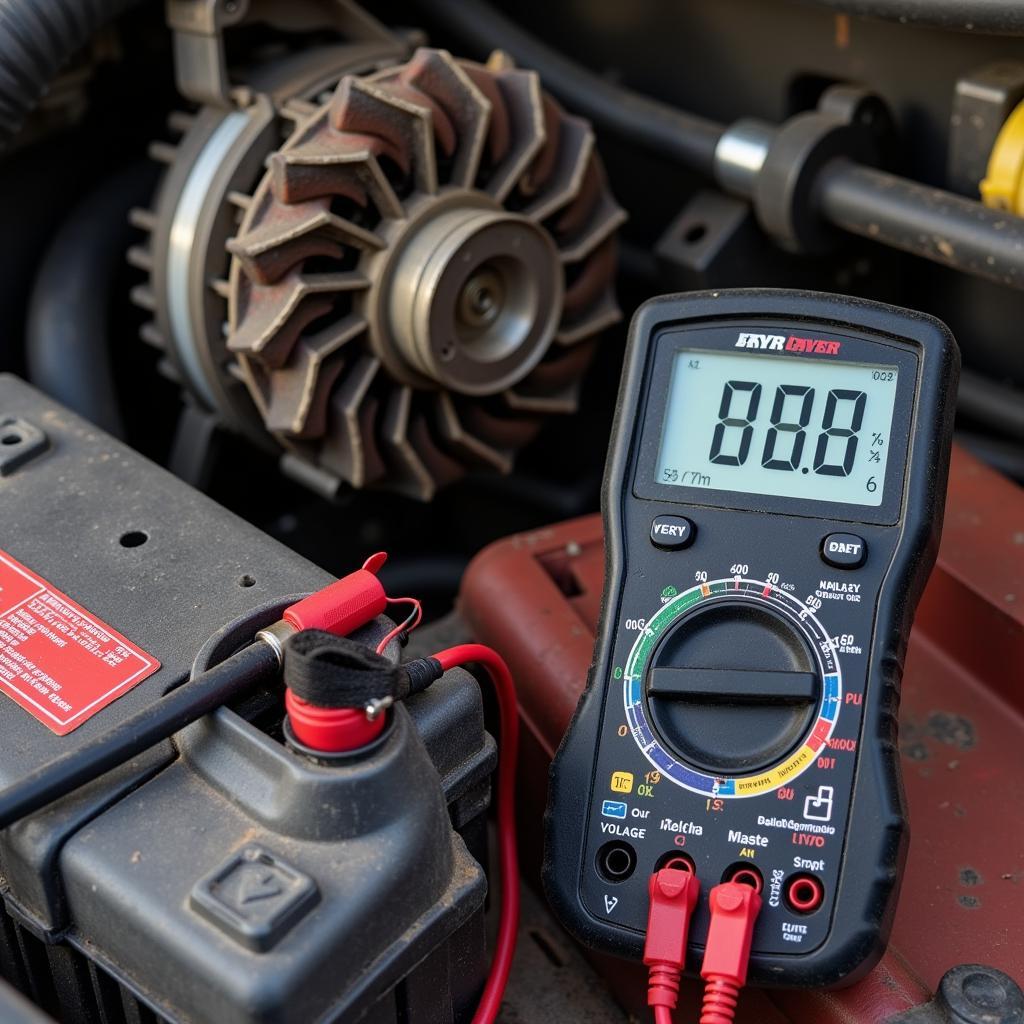Alternator Problems In Car can be a real headache. From dimming headlights to a dead battery, a faulty alternator can cause a cascade of issues. This guide provides a deep dive into diagnosing, troubleshooting, and fixing alternator problems, empowering car owners, mechanics, and technicians to tackle these issues head-on.
Understanding the Alternator’s Role
The alternator is the heart of your car’s electrical system, responsible for charging the battery and powering all electrical components while the engine is running. A malfunctioning alternator can lead to a variety of problems, ranging from minor inconveniences to complete vehicle failure. [alternator problems car won’] It’s crucial to understand the signs of a failing alternator so you can address the problem promptly.
Identifying Alternator Problems in Car
Several telltale signs indicate potential alternator problems. Dimming headlights are a classic symptom, as the alternator struggles to provide sufficient power. Other signs include flickering interior lights, a dead battery, strange noises from the engine compartment, and a burning smell. If you experience any of these, it’s time to investigate further. Don’t let a small problem become a major expense down the road.
Common Causes of Alternator Failure
Alternator failure can stem from a variety of issues. Worn-out brushes, a failing voltage regulator, damaged diodes, and loose or broken belts are common culprits. Overcharging or undercharging can also indicate problems within the alternator itself or its related components. [car dealers cause alternator problems] Understanding these potential issues can help you pinpoint the root cause of your alternator woes.
Diagnosing Alternator Problems: A Step-by-Step Guide
- Visual Inspection: Check the alternator belt for wear and tear, cracks, or looseness. A damaged belt can prevent the alternator from spinning properly.
- Battery Test: Use a multimeter to test the battery voltage. A healthy battery should read around 12.6 volts.
- Alternator Output Test: Start the engine and test the battery voltage again. With the engine running, the voltage should increase to around 13.5-14.5 volts. A lower reading indicates a potential alternator issue. [elwctrical problems with car alternator or startwr]
- Warning Light Check: If your car’s battery light illuminates on the dashboard, it’s a strong indicator of a charging system problem, often related to the alternator.
 Car Alternator Testing with Multimeter
Car Alternator Testing with Multimeter
DIY Alternator Repair or Replacement
While some alternator repairs can be done at home, such as replacing a worn-out belt, more complex issues often require professional assistance. If you’re comfortable working on your car, you can attempt to replace the alternator yourself. However, if you’re unsure, it’s best to consult a qualified mechanic.
Preventing Future Alternator Problems
Regular maintenance is key to preventing alternator problems. Ensure the alternator belt is properly tensioned and in good condition. [car alternator regulator problems] Have your battery and charging system checked regularly by a mechanic. Addressing potential problems early can save you time and money in the long run.
“Regular checks and maintenance are the most effective ways to prevent alternator issues and ensure a healthy electrical system,” says John Smith, a seasoned automotive electrician with over 20 years of experience.
How to Choose the Right Alternator Replacement
When replacing your alternator, choosing the correct part is crucial. Ensure compatibility with your vehicle’s make, model, and engine size. Opting for a high-quality alternator from a reputable manufacturer will ensure long-lasting performance and reliability. [lincoln town car new alternator problems] Don’t be tempted by cheap alternatives, as they often fail prematurely.
“Investing in a quality alternator is essential. A cheap replacement might seem appealing initially, but it could cost you more in the long run due to premature failure and potential damage to other electrical components,” advises Jane Doe, a leading automotive engineer specializing in vehicle electrical systems.
Conclusion
Alternator problems in car can be frustrating, but with the right knowledge and approach, you can effectively diagnose, troubleshoot, and fix them. Regular maintenance, prompt attention to warning signs, and choosing quality replacement parts are key to keeping your car’s electrical system healthy. For further assistance or inquiries, connect with AutoTipPro at +1 (641) 206-8880 or visit our office at 500 N St Mary’s St, San Antonio, TX 78205, United States.
FAQ
-
How much does it cost to replace a car alternator? The cost varies depending on the make and model of your car, but typically ranges from $300 to $800.
-
Can I drive my car with a bad alternator? You can drive for a short distance, but the battery will eventually drain, leaving you stranded.
-
How long does an alternator typically last? Alternators typically last between 7 and 10 years, depending on usage and maintenance.
-
What are the signs of a failing voltage regulator? Symptoms include overcharging or undercharging the battery, dimming or flickering lights, and a dead battery.
-
Can a bad battery cause alternator problems? While a bad battery won’t directly cause alternator failure, it can put extra strain on the alternator, potentially shortening its lifespan.
-
How often should I have my alternator checked? It’s a good idea to have your alternator checked during routine maintenance, typically every 1-2 years.
-
Can I test my alternator myself? Yes, you can test the alternator’s output using a multimeter.




Leave a Reply